QUESTION THREEpublished at 20:37 BST 30 March 2021

Quote MessageDo you have a realistic plan to help the NHS deal with the backlog of surgeries, investigations and appointments created by the pandemic?"
The leaders of Scotland's five larger political parties have taken part their first head-to-head TV debate of this election campaign
Those taking part are Nicola Sturgeon (SNP); Douglas Ross (Scottish Conservatives); Anas Sarwar (Scottish Labour); Lorna Slater (Scottish Greens) and Willie Rennie (Scottish Lib Dems)
Ms Sturgeon says she wants to hold an independence referendum in the first half of the new Holyrood parliament
But Conservative Mr Ross believes a focus on independence is taking away from education and the pandemic recovery
Labour's Mr Sarwar insists Scotland needs an NHS restart plan with dedicated cancer centres and investment in mental health services
Ms Slater of the Scottish Greens backs a referendum happening within the next Scottish Parliament term
Lib Dem Mr Rennie says the pandemic has knocked the NHS sideways and the next Holyrood government needs to make sure primary care has proper investment
BBC Scotland News

Quote MessageDo you have a realistic plan to help the NHS deal with the backlog of surgeries, investigations and appointments created by the pandemic?"
 Reality Check
Reality Check
Scottish Labour Leader Anas Sarwar criticised the first minister’s record on poverty, saying: “one in four children in Scotland live in poverty. In her own constituency almost 50% of children live in poverty.”
The first part of that claim is correct. Scottish government statistics published last week estimated that 24% of children (240,000 children a year) were living in relative poverty after housing costs in 2017-20.
But the claim about the first minister's constituency is more difficult to get to the bottom of. Nicola Sturgeon is MSP for Glasgow Southside.
Scottish Labour say their figure comes from research done by Loughborough University that was published in 2019. The academics there say they now do their research in Westminster constituencies not Holyrood ones and that their methodology has improved considerably since the 50% figure.
Nicola Sturgeon’s Holyrood constituency is in the Westminster constituency of Glasgow South for which the child poverty figures are significantly lower than 50%.
Nicola Sturgeon says "right now" the focus is on getting through the pandemic but she wants to see Scotland control its own future. She says that "in the fullness of time, when we are out of this", thinking about who is best to control the future of Scotland is not a distraction from the recovery, it is essential to making sure the country is rebuilt the way we want it to be.
The SNP leader has said she wants to hold an independence referendum in the first half of the next parliamentary term - within the next two-and-a-half years.
Lib Dem leader Willie Rennie says it is important to focus on recovery. He says mental health services need to be brought up to scratch, the social care sector needs to be reformed and there needs to be "bounce back" support for education. Mr Rennie says arguments over the constitution need to be put behind us.
Scottish Greens co-leader Lorna Slater says it is reasonable to ask who do we want making the decisions about Scotland's recovery. She says the Greens will call for an independence referendum in the next term of the Scottish Parliament.
Douglas Ross, the leader of the Scottish Conservatives, says he wants to make the case for the Union. He says over 30 million people in the UK have had the first jab of the Covid vaccine. "That's the Union working for people right now," he says. Mr Ross says the Scottish government are focused on independence and it takes away attention from education and recovery.
Scottish Labour leader Anas Sarwar says people across the country are struggling with the effects of the Covid pandemic. He says we should be obsessing about a recovery plan that means we do not have to choose between Covid care and cancer care - not about a referendum on independence.
Douglas Ross says the most important thing is to protect jobs and keep people in employment. He says the Scottish Conservatives would set up a job security council, a "retrain to rebuild" grant and invest and in infrastructure and high-speed broadband.
Nicola Sturgeon says April start-up grants and guaranteed 100% rates relief for the next financial year will help get the economy up and running again post-Covid,. There will also be a national transition training fund and young person's guarantee, she says, as well as a target of building 100,000 new affordable homes.
Scottish Labour leader Anas Sarwar says it will take years to recover from the aftermath of Covid and support must be maintained in a tapered way, to avoid a "cliff-edge on furlough". Power must be pushed out of parliament into regional hubs, with a proper youth jobs guarantee, he adds.
Lorna Slater says the Scottish Greens have a really positive vision with costed policies which she calls "three-way wins" - they're good for the economy, good for the people of Scotland and they help reduce emissions, like their "rail for all' programme.
Willie Rennie says Scotland's biggest talent is its people and reskilling through education and investment in technology. We need to make sure support is there for the hundred of thousand of people who have missed out on it altogether, he adds.

Quote MessageWhy can’t we get through this pandemic and start to recover before another referendum?"
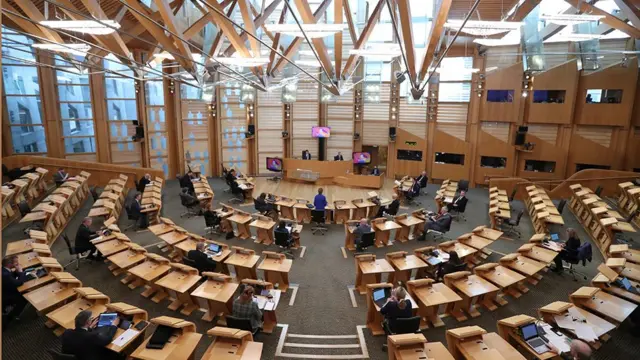 Image source, Reuters
Image source, ReutersWhat election is this? On 6 May, people across Scotland will vote to elect 129 Members of the Scottish Parliament (MSPs).
The vote is now held every five years, and this will be the sixth election in its history, since it was established in 1999.
The party that wins the most seats will form the Scottish government. Find out more here.
What powers does the Scottish Parliament have? MSPs pass laws on most aspects of day-to-day life in Scotland, such as health, education and transport.
They also have control over some taxes and welfare benefits. Defence, foreign policy and immigration are decided by the UK Parliament.
How do I vote? Anyone who lives in Scotland and is registered to vote is eligible, so long as they are aged 16 or over on the day of the election. You can register to vote online.

Quote MessageWhat is your plan for the economy of Scotland over the next three to five years? How do you plan to rebuild our economy post-pandemic?"
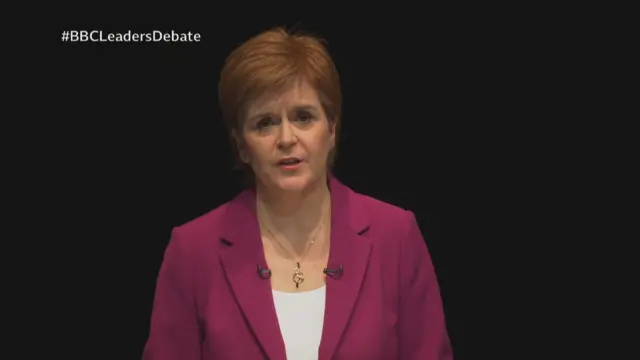
SNP leader Nicola Sturgeon uses her opening statement to say these are serious times and they demand serious leadership.
She says she has done her best over the past year to lead the country through the Covid pandemic.
Ms Sturgeon says she offers continued strong leadership to guide us through the crisis, which is not over yet.
"We need an experienced hand at the wheel," she says.
Ms Sturgeon talks of "bold policies" such as a National Care service, more affordable homes, action to tackle climate change and end child poverty.
When the Covid crisis has passed, she says, there will be a choice on independence so that decisions about Scotland's future can be made here not with Boris Johnson in Westminster
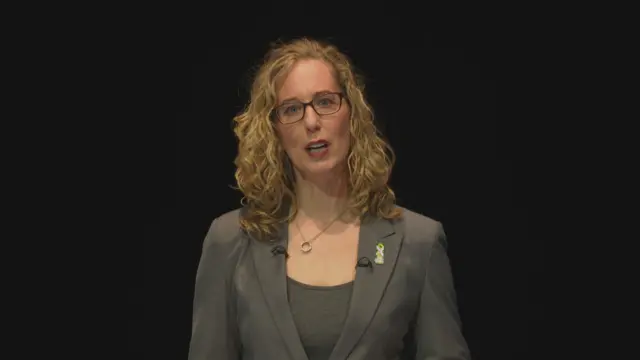
Scottish Greens co-leader Lorna Slater says the pandemic has proved that Scotland’s economy is propped up by low wages, insecure work and a social security system that is full of holes.
“We must not go back to this broken system”, she says.
Ms Slater sets her stall out early on climate change, saying science tells us we have less then 10 years before the climate breakdown goes past the point of no return.
“The time to act is now,” she adds and the Scottish Greens have a plan for a “fair and green recovery” by investing in public transport, renewable energy “and restoring our natural environment" – creating tens of thousands of jobs.
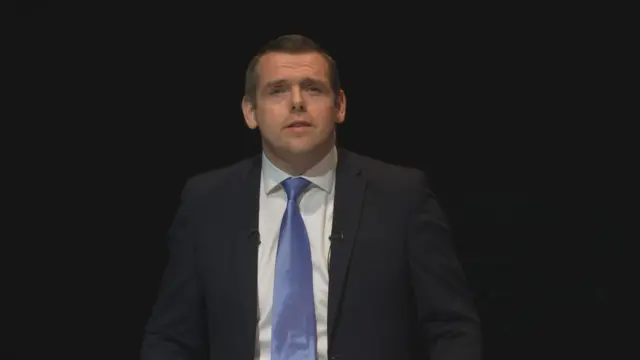
Douglas Ross opens by stressing that the focus of the election should be about recovering from Covid and rebuilding Scotland.
“We should focus on delivering opportunities for the next generation,” he tells the audience.
He mentions his own son Alistair and draws parallels with voters’ own families.
Mr Ross says: “All the parties tonight are speaking about recovery. There’s one big difference. The SNP wants to take us through another divisive independence referendum and the Scottish Conservatives want to stop them. The future of our country is at stake.”
He concludes by stressing that if voters want to stop another referendum, protect jobs, and rebuild Scotland’s economy then they should vote Scottish Conservative.
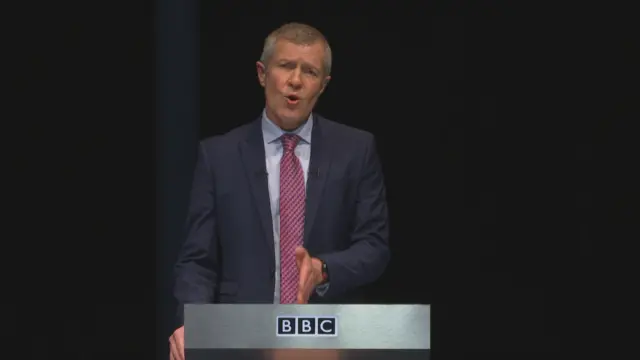
Scottish Liberal Democrats leader Willie Rennie says he wants to spend "every second, every moment" of the next five years "putting the recovery first".
That means cutting mental health waiting lists, supporting pupils in schools and creating jobs, as well as taking action on the climate, he says.
This is not he moment for another referendum, he insists.
Mr Rennie says he has 15 years experience in both the London and Edinburgh parliaments, and has led his party for 10 years.
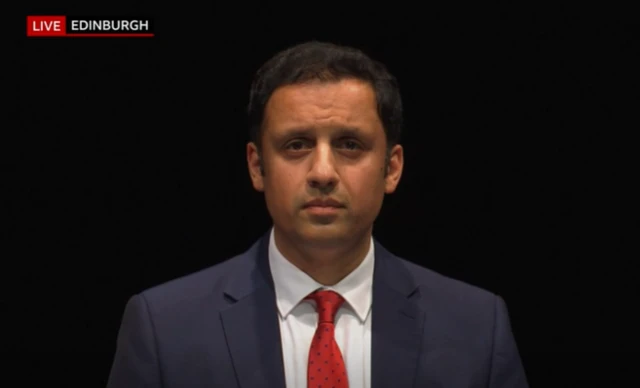
Scottish Labour's Anas Sarwar is the first of the party leaders to make an opening statement. He says this year has been the hardest of our lifetime.
He says he is determined to restart the economy and create jobs, restore our children's education and renew our NHS.
Mr Sarwar says he will focus on what unites us as a country, not what divides.
He wants to build a stronger and fairer Scotland, he says.
Kirsten Campbell
BBC Scotland political correspondent
Ask the party leaders how they’re feeling ahead of the first leaders’ debate of this election and most will admit to nerves.
They will have prepared for tonight, with party officials playing the role of debate host Sarah Smith. They’ll have practised the sound bites they want to be associated with, and rehearsed the answers to the questions they’re expecting to be asked.
The challenge will come in how they respond to the unexpected, to the audience curve-ball they couldn’t have anticipated.
Success may not be defined by who performs best, but rather who gets through it gaffe-free.
Allow X content?
This article contains content provided by X. We ask for your permission before anything is loaded, as they may be using cookies and other technologies. You may want to read X’s cookie policy, external and privacy policy, external before accepting. To view this content choose ‘accept and continue’.
The BBC considers a number of factors when deciding who takes part in its TV election debates.
One of those factors is based on previous and current electoral support. For example, the parties featuring in Tuesday's broadcast had MSPs elected to Holyrood in 2016.
They also have elected representation in other chambers, such as local councils and at Westminster.
Ahead of an election, the BBC issues a set of guidelines, which can be found here.
They are general rules outlining how the broadcaster will cover things like day-to-day campaigning and debates.
Although the leaders of smaller parties will not appear in this live television event, there will be impartial and proportionate coverage of their campaigns in the coming weeks.
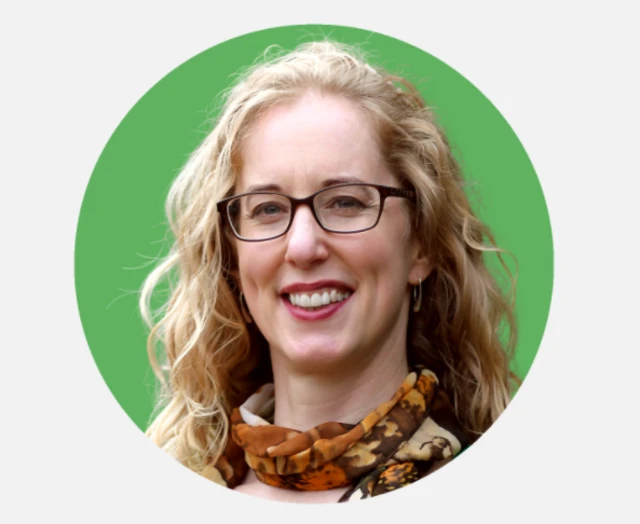
Lorna Slater is the only member of the panel who is not currently a sitting MSP or MP, but she will stand in Edinburgh Northern and Leith in the forthcoming Holyrood election.
Born in Canada, Ms Slater is an electro-mechanical engineer working in marine renewable energy.
She most recently project-managed the construction of powertrains for the world’s most powerful tidal turbine, which is currently being assembled in Dundee.
Ms Slater became politically involved during the run-up to the 2014 Scottish independence referendum, where she campaigned in favour of Scottish independence.
She has been an election candidate for the Scottish Greens several times, including the 2016 Scottish Parliament election, the 2017 general election and the 2019 European Parliament election.
She has served as co-convener of the Scottish Greens operations committee and stood in the party’s first co-leadership election, where she was elected alongside Patrick Harvie for a two-year term in August 2019.
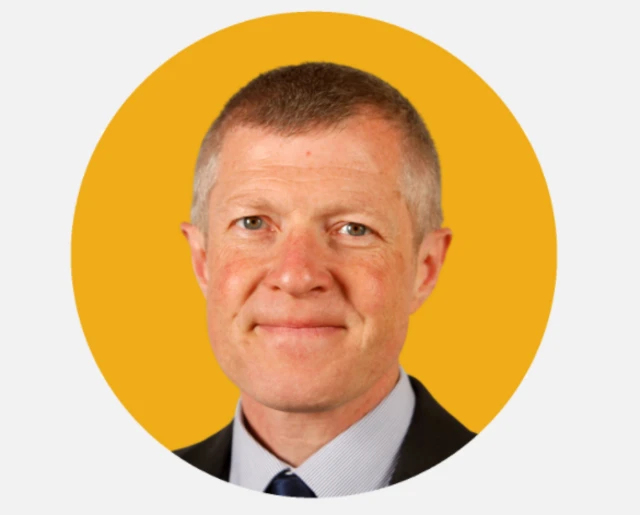
Willie Rennie is a former MP and sitting MSP who has been leader of the Scottish Lib Dems since 2011.
Born and raised in Fife, Mr Rennie has worked for the party all his adult life, having managed election campaigns in England in the 1990s before serving as the chief executive of the party in Scotland.
He was elected to Westminster after a shock by-election win in Dunfermline and West Fife in 2006, overturning a Labour majority of almost 12,000 votes.
Labour retook the seat in the 2010 general election, but Mr Rennie was not out of politics for long – he was elected to Holyrood the following year. He was immediately appointed leader of the Scottish Lib Dems as the only candidate to come forward following the resignation of Tavish Scott.
Originally elected on the Mid-Scotland and Fife list, Mr Rennie took the North East Fife seat from the SNP in 2016.
A keen runner, he has developed a reputation as an energetic campaigner and is known for his colourful photo-calls on the election trail.
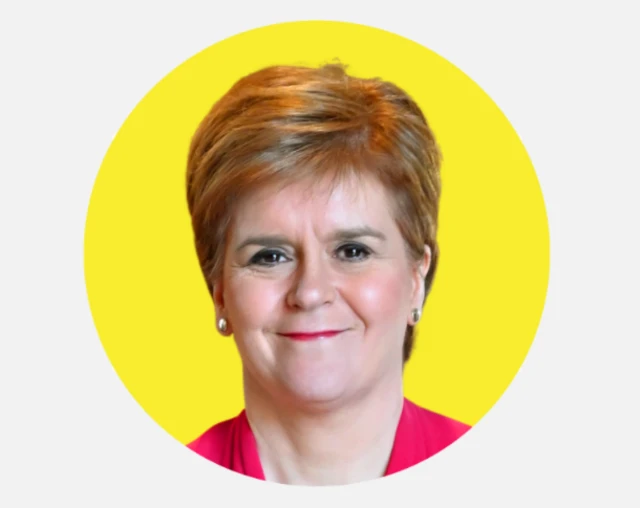
Nicola Sturgeon has been leader of the SNP and First Minister of Scotland since November 2014.
She took over from Alex Salmond when he stood down following the defeat of the Yes campaign in the 2014 Scottish independence referendum.
Ms Sturgeon had previously served as deputy first minister and health secretary.
She has been a member of the Scottish Parliament since 1999 - originally elected from the party’s regional list before winning the seat of Glasgow Govan in 2007.
Born in the North Ayrshire town of Irvine in 1970, Ms Sturgeon studied law at the University of Glasgow and worked as a solicitor after graduating in 1992.
She lives in Glasgow with her husband Peter Murrell, who is the chief executive of the SNP.
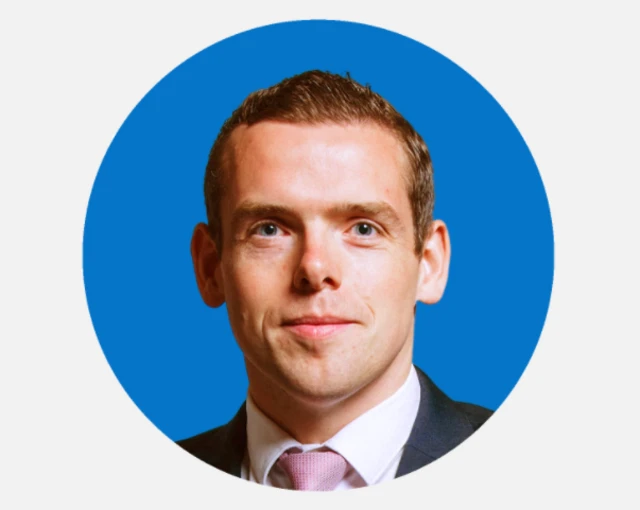
Douglas Ross has been leader of the Scottish Conservatives since August 2020.
Having trained at the Scottish Agricultural College and worked as a dairy farmer, he was elected to the Scottish Parliament in 2016.
However, he left a year later for Westminster, after taking his local constituency of Moray from the SNP’s then-deputy leader Angus Robertson. Mr Ross retained that seat in 2019, but now hopes to return to Holyrood the same way he arrived in 2016 – via the Highlands and Islands regional list.
The MP was appointed as a junior minister in the Scotland Office in 2019, but resigned the following year in protest over Dominic Cummings continuing to serve as an aide to Prime Minister Boris Johnson despite controversy over his activities in lockdown.
He was elected Scottish Tory leader unopposed in August 2020 when Jackson Carlaw stepped down after just six months in the job.
Outside of politics, he is a qualified football referee, and has officiated at matches in the Scottish Cup, the Champions League and international fixtures.
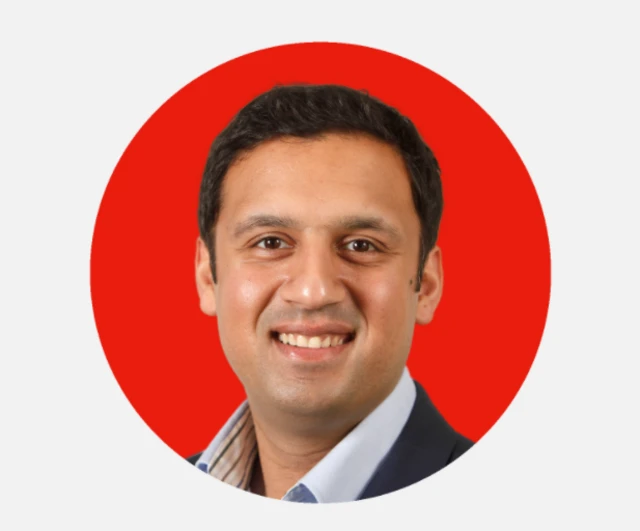
Anas Sarwar was only elected as the new leader of Scottish Labour on 27 February this year, replacing Richard Leonard who had led the party for three years.
The Glasgow MSP became a member of the Scottish Labour party at the age of 16.
His father, Mohammad Sarwar, was the UK's first ever Muslim MP and held the Glasgow Central seat for Labour between 1997 and 2010 - until his son Anas succeeded him.
Mr Sarwar graduated from the University of Glasgow and worked as a dentist in Paisley for five years prior to becoming an MP.
The 38-year-old was the Glasgow Central MP from 2010 to 2015 and took an active role in the pro-Union campaign leading up to the 2014 independence referendum, before losing his seat to the SNP’s Alison Thewliss in the 2015 general election.
He was elected a list MSP for Glasgow at the last Scottish parliamentary election in 2016. H lost an initial La bour leadership election in 2017 to Richard Leonard before beating Monica Lennon in another contest last month to succeed Mr Leonard.